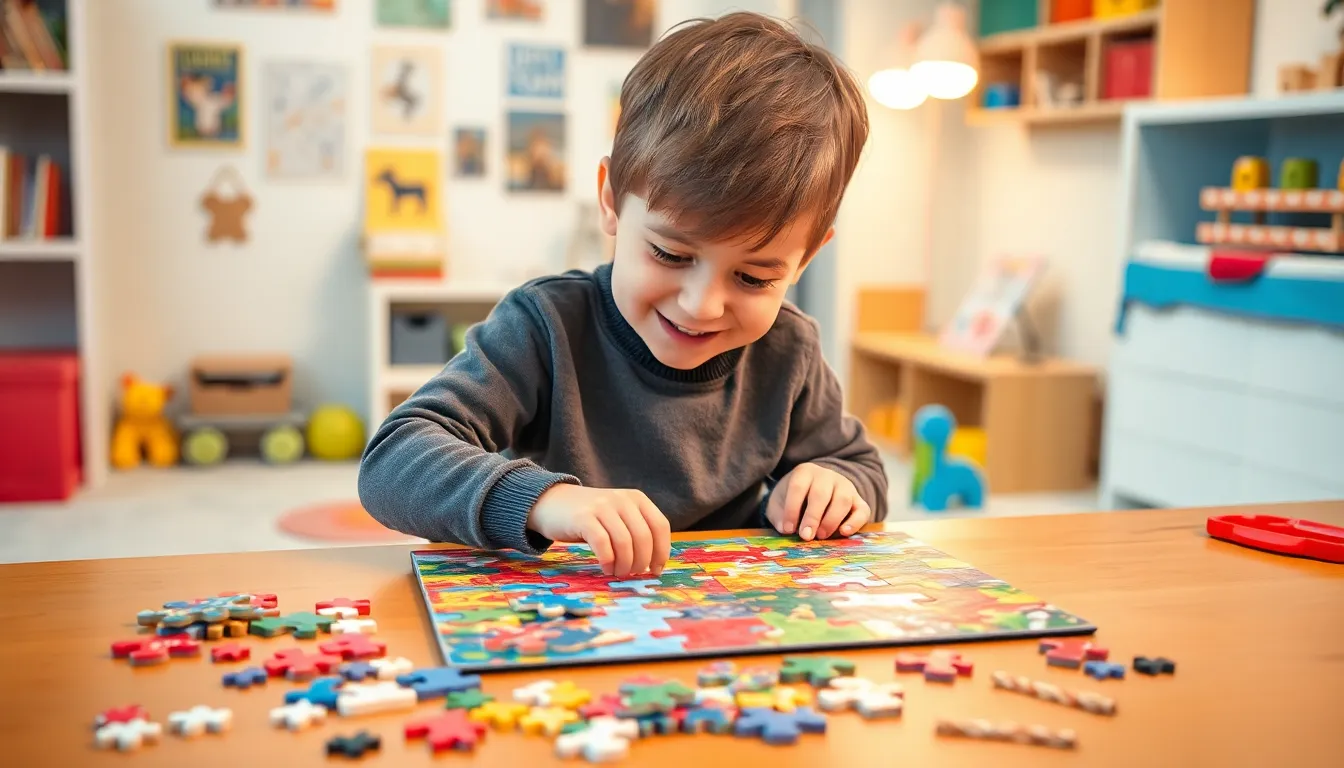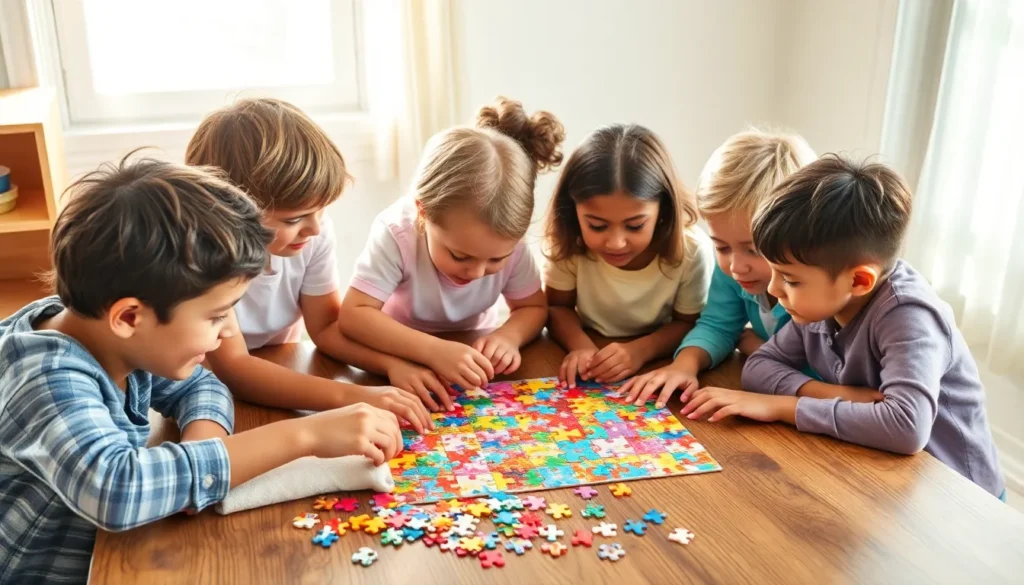In a world overflowing with screens and distractions, puzzle kids are the unsung heroes of creative problem-solving. These little masterminds thrive on challenges, turning jumbled pieces into masterpieces with an enthusiasm that could rival a toddler on a sugar rush. Whether it’s a jigsaw puzzle or a brain-teasing riddle, kids who tackle puzzles aren’t just having fun—they’re sharpening their minds and developing skills that’ll serve them well into adulthood.
Imagine a child, fiercely focused, piecing together a colorful landscape while the rest of the family debates over the latest blockbuster movie. That’s the magic of puzzle kids. They learn patience, persistence, and the satisfaction of seeing a challenge through to the end. So, if you’re looking for a way to boost your child’s cognitive skills while keeping them entertained, it’s time to embrace the wonderful world of puzzles. Who knew learning could be this much fun?
Puzzle Kids
Puzzle kids represent a unique group of children who engage deeply with puzzles, enhancing cognitive skills while having fun. These children tackle various types of puzzles, including jigsaws and riddles, to develop their problem-solving capabilities. Such activities encourage creativity, and foster critical thinking, as they connect pieces or decipher clues.
Problem-solving operates on multiple levels for these children. Spatial awareness becomes sharper while they work on jigsaw puzzles, making connections between pieces. Logical reasoning strengthens as they attempt to solve riddles or brain teasers. Completing these challenges instills a sense of achievement, motivating them to seek out new puzzles.
Patience and persistence emerge as key traits in puzzle kids. As they wrestle with difficult puzzles, children learn that success often requires time and effort. This understanding translates into other areas of learning, promoting resilience in the face of obstacles. When children encounter challenges in school or everyday life, these traits enable them to approach problems with a constructive mindset.
Social skills also develop through collaborative puzzle-solving experiences. Group activities promote teamwork and communication, allowing children to share ideas and strategies. Engaging in puzzle activities with peers fosters a sense of camaraderie, enhancing both social interaction and shared enjoyment.
Overall, puzzle kids thrive in environments that encourage exploration and challenge. By diving into puzzles, these children not only gain a sense of accomplishment but also strengthen essential skills that benefit them throughout their lives.
Benefits of Puzzle Kids

Engaging in puzzles offers numerous advantages for children. These benefits span cognitive development and problem-solving skills, essential for their growth.
Cognitive Development
Cognitive abilities improve significantly through puzzle-solving activities. Children enhance memory, attention span, and concentration as they work to fit pieces together. Engaging with jigsaw puzzles fosters spatial awareness, helping kids understand how different shapes and sizes fit together. Logical reasoning becomes sharper when they strategize which pieces to place next. Research from the University of Cambridge indicates that puzzle-solving can develop critical thinking skills, leading to better performance in academic subjects. Children gain confidence as they experience a sense of achievement upon completing puzzles.
Problem-Solving Skills
Puzzle-solving directly enhances problem-solving skills in children. They learn to identify patterns, evaluate options, and make decisions quickly. Encouraging persistence during challenging puzzles fosters resilience, a valuable trait for facing obstacles later in life. Collaborating with peers on group puzzles promotes communication, allowing children to articulate thoughts and reason through challenges together. Studies show that this collaborative approach increases social skills while deepening their understanding of problem-solving strategies. The more puzzles children tackle, the better they become at approaching various challenges, both in and out of the classroom.
Types of Puzzle Kids
Puzzle kids engage with various types of puzzles, each contributing uniquely to their cognitive and social development. These categories include jigsaw puzzles, logic puzzles, and interactive puzzles.
Jigsaw Puzzles
Jigsaw puzzles represent a classic type of challenge for children. They enhance spatial awareness as kids visually manipulate various pieces to complete an image. Completing these puzzles fosters patience; children learn to take their time while examining multiple options before making a decision. Studies show that regular engagement with jigsaw puzzles can boost problem-solving skills. Successful completion of a jigsaw also instills a sense of achievement, motivating children to tackle more complex challenges.
Logic Puzzles
Logic puzzles provide a different yet beneficial experience. These puzzles often come in the form of riddles, brain teasers, or Sudoku, requiring children to think critically and logically. Solving these challenges hones analytical skills, as kids evaluate multiple steps to find the correct answer. Children must recognize patterns and formulate strategies, which enhances their overall cognitive ability. Many educators use logic puzzles in classrooms to promote critical thinking among students, further reinforcing their importance in child development.
Interactive Puzzles
Interactive puzzles introduce technology into puzzle-solving. Digital platforms feature engaging formats like apps and games that allow children to puzzle independently or collaboratively. This category combines fun and education effectively; kids explore problem-solving techniques while honing their fine motor skills. Engaging with interactive puzzles often enhances focus and concentration, as kids navigate through various levels of difficulty. Collaborative options in these puzzles promote teamwork, helping children to communicate and share strategies with peers for a more enriching learning experience.
Popular Puzzle Kids Products
Puzzle toys play a crucial role in engaging children and enhancing their skills. Jigsaw puzzles come in various themes and difficulty levels. These puzzles typically feature vibrant images that captivate young minds while developing spatial awareness. Logic puzzles, such as riddles and brain teasers, challenge children’s analytical thinking. Solving these types of puzzles fosters critical thinking and enhances cognitive abilities.
Interactive puzzles incorporate technology into the traditional puzzle experience, allowing for both independent and collaborative play. Electronic puzzle games often provide feedback and progress tracking, motivating children to continue solving and improving their skills. Brands like Melissa & Doug and Ravensburger offer high-quality jigsaw puzzles that cater to different age groups, ensuring all children can find suitable challenges.
3D puzzles, which add a dimensional element, engage puzzle kids in a unique way. These puzzles often require teamwork, enhancing social skills while making the solving process more enjoyable. Companies like CubicFun and Hasbro provide a wide range of 3D puzzles from famous landmarks to beloved characters.
Magnetic puzzles also offer versatility; they stick to surfaces, allowing for easy manipulation and display. Magnetic building sets can cultivate creativity and problem-solving skills through construction play.
Puzzle games that focus on math or science topics additionally promote educational growth while being fun. Board games with puzzle elements, such as Rush Hour and Blokus, encourage strategic thinking and cooperative gameplay. Parents and educators frequently recommend these products for their ability to develop resilience and critical skills.
The diversity and popularity of these products reflect the importance of puzzles in fostering children’s development. Engaging with various types of puzzles helps children thrive as they learn enjoyment in solving challenges.
Tips for Choosing the Right Puzzle
Selecting the right puzzle for children involves considering their age and skill level. Choose puzzles that align with a child’s interests to promote engagement. Look for various puzzle types, such as jigsaw puzzles, logic puzzles, and interactive puzzles, each offering unique benefits. Evaluate the puzzle’s difficulty level to ensure it’s challenging yet achievable, fostering a sense of accomplishment.
Check for the quality of materials used; durable puzzles withstand frequent handling. Assess the size of puzzle pieces, as smaller pieces can pose a choking hazard for younger children. Consider themed puzzles that capture attention; popular themes include animals, landscapes, or favorite cartoon characters.
Encourage collaboration by selecting puzzles designed for multiple players, which strengthen social skills through teamwork. Opt for puzzles that offer educational themes, such as math or science, to enhance learning while having fun. Review customer ratings and reviews for insights into the durability and engagement level of puzzles before making a purchase.
Seek recommendations from educators or parents with similar interests in developmental tools. Explore online resources or local stores that provide a variety of puzzles. Choose puzzles that incorporate technology, providing interactive elements that promote independent exploration and learning.
Incorporating these tips will guide parents and guardians in selecting the ideal puzzles for their children, ensuring an enriching and enjoyable experience.
Conclusion
Engaging children in puzzles cultivates essential skills that extend far beyond mere entertainment. These activities not only enhance cognitive abilities but also foster social skills through collaboration. As children tackle various puzzles they develop patience persistence and resilience which are crucial for their overall growth.
Choosing the right puzzles tailored to a child’s interests and skill level can significantly impact their learning journey. With the right guidance parents can help their children thrive as they embrace challenges and enjoy the process of problem-solving. Puzzle kids are not just playing; they’re building a foundation for lifelong learning and success.

